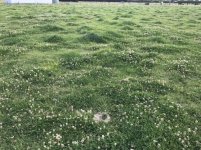More thoughts from the day ... not sure this is the place for it, but in an effort to lower Grant's stress level .....
We been on the bees again today, escaping honey, disease checking, and the Apivar arrived so we are putting that in too.
The interesting part is looking at the hives , the strength of the bees at this time of year, and the crops they have produced.
There was a lot of clover around this year, but the yields have been a bit ho hum.
Hives that came home from the coast a month ago onto paddocks white with clover produced us another box and a half. Compared to bees we left on the Rata that made us another three boxes.
The bees on the clover paddocks have no bees ...... correction ..... they have bees and slabs of brood, but the honey boxes are short on workers.
Head up into the honey dew sites and we have bees for Africa ......
I am coming to the conclusion that the flatlands of Canterbury are a polluted land. Something is going on that is killing the field force as it ventures out into the blue, whether that be irrigators, insecticides applied to cow wintering crops ..... or fungicides and herbicides to keep us clean and green.
And the thought occurred that next year we would probably do better to leave all the flatland hives in the foothills where the irrigators aren't needed and the cocky's spray rig can't reach.
The only downer is that we loose the gauranteed pollination income.
We been on the bees again today, escaping honey, disease checking, and the Apivar arrived so we are putting that in too.
The interesting part is looking at the hives , the strength of the bees at this time of year, and the crops they have produced.
There was a lot of clover around this year, but the yields have been a bit ho hum.
Hives that came home from the coast a month ago onto paddocks white with clover produced us another box and a half. Compared to bees we left on the Rata that made us another three boxes.
The bees on the clover paddocks have no bees ...... correction ..... they have bees and slabs of brood, but the honey boxes are short on workers.
Head up into the honey dew sites and we have bees for Africa ......
I am coming to the conclusion that the flatlands of Canterbury are a polluted land. Something is going on that is killing the field force as it ventures out into the blue, whether that be irrigators, insecticides applied to cow wintering crops ..... or fungicides and herbicides to keep us clean and green.
And the thought occurred that next year we would probably do better to leave all the flatland hives in the foothills where the irrigators aren't needed and the cocky's spray rig can't reach.
The only downer is that we loose the gauranteed pollination income.



